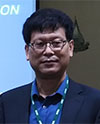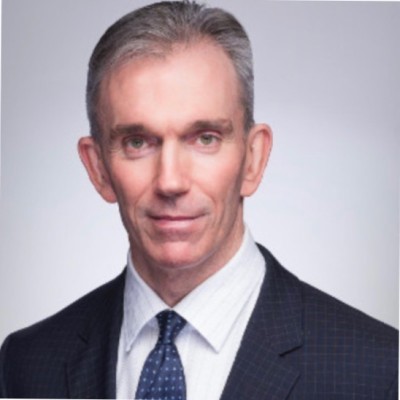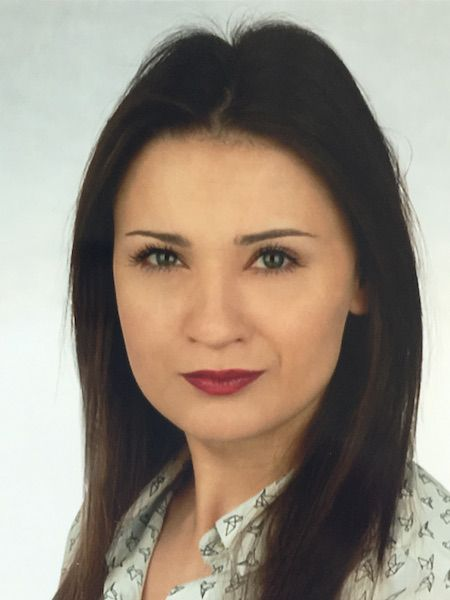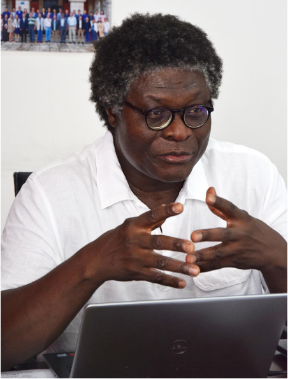

Speakers

Prof. Xiangyang Zhang
Institute for Open Education, Suqian University, China
Research interests: Open Pedagogy, OER, Online Learning, Online Course Design
profile:As Global Ambassador for OER advocacy and a member of Open and Educational Resources Advocacy Committee, the International Council for Open and Distance Education (ICDE), Prof. Zhang has actively participated the international ODeL community activities, working as reviewer for some scholarly journals on open and distance and distributive learning, publishing scholarly papers internationally and domestically on Open, Distance and eLearning (ODeL), Open Pedagogy, Distance Teacher Education, MOOCs, SPOCs presenting at international conferences, some of which organised by AAOU, ICDE at UK, India, Hong Kong, Taiwan, Moscow and Toronto. And in 2014 his paper was awarded silver medal of best practice paper at the 28th AAOU conference in Hong Kong. Apart from academic publications, Prof. Zhang works as consultant for pedagogy, educational technology and online course design for open and distance teaching institutions in China to establish cooperation and collaborations with EU educational projects.
His expertise in OER offers him opportunities to be panelist speakers at International conferences or webinars. He lectures on Linguistics, and Research Methodology in real or virtual classrooms in addition to research on Distance Teacher Training, Online Course Designs, Blended Learning and OERs. He holds memberships in IATEFL, IWEA, AILA, TTA, and ICDE.
SpeechTitle: Accommodating the Leadership in the Future of Education and Research: from Open Education to Open Science
Abstract: The explosive outbreak and worldwide spreading of Covid-19 have caused profound impact upon education around the globe. The pandemic has further expanded the wide gap between the North and South financially, economically and technologically and increased disparity of formal and non-formal education. Consequently, the pandemic harms the world not just in the public hygiene and medical emergency, but also in the economies, academic scholarship and education.
However, the whole situation in the pandemic crisis seems not so dreadful as such. The international Open Access movement initiated during 2000’s and Open Educational Resources recommended by UNESCO in 2019 came to fill in the divides together with digital infrastructures. All actors and stakeholders with varieties of expertise have contributed to the fulfilment of educational equality and equity in the global context, for instance, the International Council for Open and Distance Education (ICDE) via its subordinate committee, Open Educational Resources Advocacy Committee has been deeply engaged in the events, to cite a few. In the last year, UNESCO has drafted a recommendation for Open Science and planned the blueprint for the future education in 2050, wishing to improve the educational and scientific landscape for the world.
In this speech, the speaker will commence with reflection on the upscaling of the Open Education from international perspective, and then address on the issues of emerging Open Science in terms of its definitions, dimensions, the current international practices with potential impediments it might stumble upon. Whatever obstacles lying on the road to Openness, the speaker concludes, the Open Science represents its leadership in the future of education and scientific research.

Assoc. Prof. Marcus T. Anthony
Beijing Institute of Technology (Zhuhai), China
Research Area: Futures Studies、Education, including transforming the Chinese education system、The development of China and the Greater Bay Area、Human intelligence、Sense making in the digital age
profile: Anthony has worked in Education for twenty-five years, teaching in Australia, New Zealand, mainland China, Hong Kong and Taiwan.
Anthony has held teaching or administrative positions at Trinity College, University of Melbourne; the Beijing No. 2 Foreign Language Institute; the International School of Beijing, and the University of Wales (Bangor) in Sichuan. Anthony has twice been Director of Studies and once head teacher.
He is currently the co-ordinator of the Global Talent 2050 platform, and has a commitment to understanding how the Greater Bay Area Initiative can be developed to ensure a prosperous future for the region, for China and for the world.
Anthony is a prolific writer and public speaker. He has published ten popular and academic books including Integrated Intelligence (Sense Publishers, Copenhagan). He has also published fifty academic journal papers and book chapters, including chapters in the Causal Layered Analysis Reader, and Doctoral Research in Management and Business in Hong Kong.
SpeechTitle: A critical futures studies perspective on sensemaking and embodiment in the digital society.
Abstract: Futures Studies is a social science which examines the way we think about and create the future. This presentation employs several the key concepts and methods of Futures Studies to unpack the concept of web 3.0, sometimes known as the Metaverse. This is an all-immersive internet featuring virtual, augmented reality and the Internet of Things. In particular, this presentation will examine the role of embodiment – the felt sense and identity of self – in the Metaverse. This will include the presenter’s model of an “integrated intelligence,” which is built around the relationship of mind, body and environment.
The first part of the presentation will briefly introduce Critical Futures Studies. The second part will use futurist Sohail Inayutullah’s Causal Layered Analysis to unpack common representations of the Metaverse, and in particular in terms of the potential role of the body and its innate intelligence. Finally, the presentation will posit four possible scenarios of the Future of the Metaverse as a means to suggest alternative visions of the future.

Assoc. Prof. Joanna Rak
Adam Mickiewicz University, Poznań, Poland
Research Area: political violence, militant democracy, democratic and nondemocratic regimes, contentious politics, protest movements
Profile: Joanna RAK – Associate Professor at the Faculty of Political Science and Journalism, Adam Mickiewicz University in Poznań. In 2016-2021, she was a visiting researcher at CEU San Pablo University in Madrid, Universidad de Navarra, and Charles III University of Madrid. She is the principal investigator of the research projects “The Culture of Political Violence Dynamics of Anti-austerity Movements in Europe” and “Contentious Politics and Neo-Militant Democracy” financed by National Science Centre, Poland. The author of the book “Theorizing Cultures of Political Violence in Times of Austerity: Studying Social Movements in Comparative Perspective” (Routledge, New York 2018) and a co-editor of the book “Neo-militant Democracies in Post-communist Member States of the European Union” (Routledge, New York 2022). Research interests: cultures of political violence and social movements. The laureate of the Barbara Skarga Scholarship and START Scholarship by the Foundation for Polish Science. Contact: joanna.rak@amu.edu.pl.
SpeechTitle: Weakening Neo-Militant Democracies in Crisis-driven European Union
Abstract: Why do contemporary European militant democracies, called neo-militant democracies, become vulnerable to threats? Why do their self-defense mechanisms turn inefficient in protecting democracies from their enemies? Who are enemies of democracy? What is the role of robots for democracy protection in the context of those questions? On the one hand, this speech reflects on the relationships between a neo-militant democracy and robots, the two phenomena of increasingly growing importance in the 21st century. On the other hand, it seeks other potential sources of neo-militant democracies’ vulnerability to threats in the social environment determined by new technology development. The speech aims to advance theory-driven hypotheses. First, they show that the greater the freedom to interpret restrictions on political and civil rights and liberties, the greater the likelihood that a neo-militant democracy will remain vulnerable. Second, the smaller the scope of the inclusion of new threats in the imposed restrictions, the greater the possibility that these threats will remain outside legal definitions. Third, the weaker the civil society, the greater the likelihood that a neo-militant democracy will remain vulnerable and drift towards a quasi-militant democracy. Fourth, the higher the level of passive consent or acceptance of the anti-democratic solutions weakening the sovereignty of a political nation, the greater the likelihood of a quasi-militant democracy forming. While these hypotheses compete with each other, they are not mutually exclusive. It is worth considering their importance when building a research-based model to account for the sources of the weakness of neo-militant democracies.

Prof. Augustin F. C. Holl
Xiamen University, China
Université Libre de Dakar, Senegal
Research Area: Anthropological Archaeology, Material culture, Technological change, The emergence of complex societies; Mortuary Archaeology, Archaeology of Visual Representations, Ethnoarchaeology of pastoral societies; West African Archaeology; Emergence of food production; Archaeology of African diaspora (New York African Burial Ground Research Project); West African Prehistory: Prehistoric adaptation to marginal dry lands; Sahel, Sahara (West Africa) and the Negev desert (Israel), Cultural Heritage
Profile: Augustin F.C. Holl (PhD 1983, Paris-1: Pantheon-Sorbonne, Habilitation 1994, Paris X-Nanterre) is now Distinguished Professor and Director of the Africa Research Center at Xiamen University, (Fujian, P.R. China). He was successively professor of anthropology at the University of California, San Diego, Curator at the Museum of Anthropology, Professor of Anthropology and Professor of Afro-American and African studies at the University of Michigan, Ann Arbor (USA), Professor and Vice-President for International Relations at Paris-Nanterre University (France), and Deputy-Director at the Institute of Humanities and Social Science (CNRS, Paris, France). He has conducted fieldwork in the Negev desert (Israel), Dhar Tichitt (Mauretanian Sahara), Mouhoun Bend (Burkina Faso), Houlouf region (Cameroon), Senegambian Megaliths and Saloum Shell-middens (Senegal). He has published fifteen books including The Diwan Revisited (2000), Ancient African Metallurgy (2000, with M.S. Bisson, S.T. Childs, and P. De Barros), The Land of Houlouf (2002), Holocene Saharans (2004), Ethnoarchaeology of Shuwa-Arab Settlements (2003), Saharan Rock Art (2004), and West African Early Towns (2006), Africa: The Archaeological Background (2015) and Megaliths, Cultural Landscape and the Production of Ancestors (2017), and numerous papers in top journals in his research fields.
SpeechTitle: Global Archaeology and the Interdisciplinary Imperative: The Case of Austronesian Expansion
Abstract: Archaeology as a field of investigation, stretched over humanities and social sciences also relies on natural and physical sciences to probe human biological and cultural evolution at all time scales. As such, it has a broad scope, and tends to be a natural “Meta-discipline” that fed on multi-disciplinarity to make its cases. Despite many different definitions, global archaeology as relied upon in this presentation is equally a “Meta-archaeology” that investigates long-term evolutionary processes at different time-scales, its principal subject matter being human populations dynamics. Such a research program is axiomatically inter-disciplinary, weaving different disciplinary approaches to address well delineated research problems. The Expansion of Speakers of Austronesian languages – also called “Austronesian Migration Theory” is relied upon to showcase a specific instance of Human population dynamics. The research topic blends results obtained from languages classification and historical linguistics, archaeology demography, technology, aDNA (ancient DNA) genomics, as well as cultural anthropology.
A “Neolithic package” derived from the Middle Yangtse valley appears around 3500 BCE along China southern coastline and islands. These Ancestral Austronesian (AN) introduced rice and millet, red slipped pottery, bark cloth technology, loom weaving, dog, pig, and very likely water buffalo in Mid-Holocene Taiwan. After approximately 1000 years of expansion in all suitable environmental settings of the Islands, out- migrations started in the direction of the Philippines, then the rest of Islands Southeast Asia, and from there to the Eastern and southern Pacific on the one hand, and the western Indian Ocean on the other. The expansionary process fueled by specific forms of social organization – House-Societies – and technological innovations – Out-trigger canoes, Catamaran, and Trimaran - triggered varying forms of cultural and phenotypic adaptations resulting on the formation of resilient seafaring communities. Such interesting research results are out of reach of any single discipline, making inter-disciplinarity an imperative.
